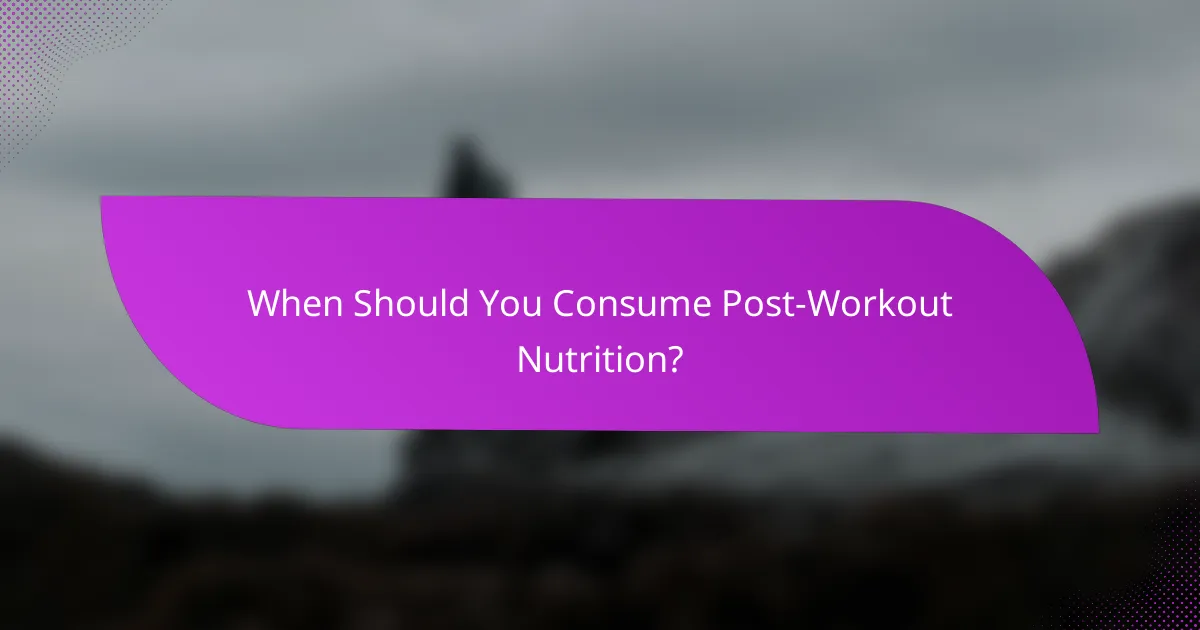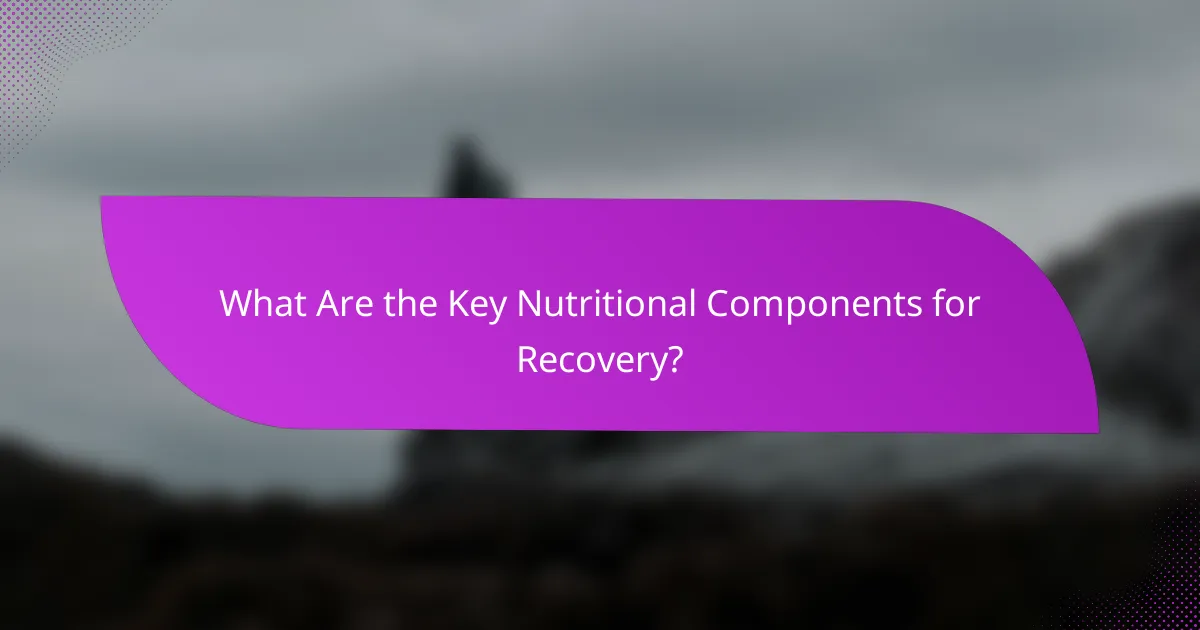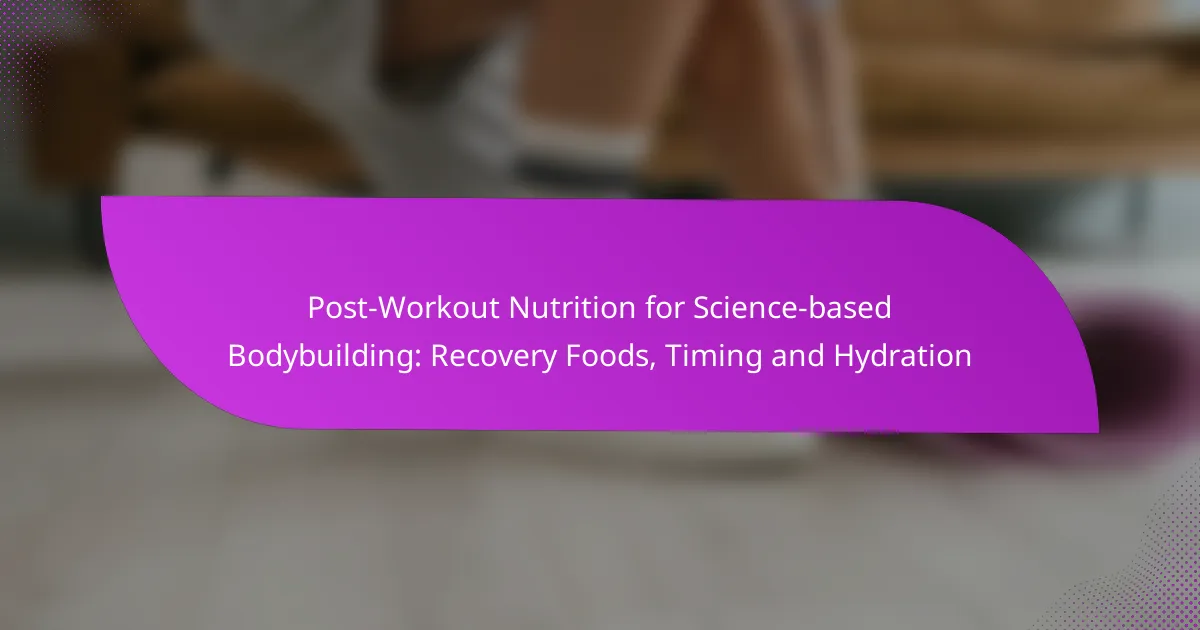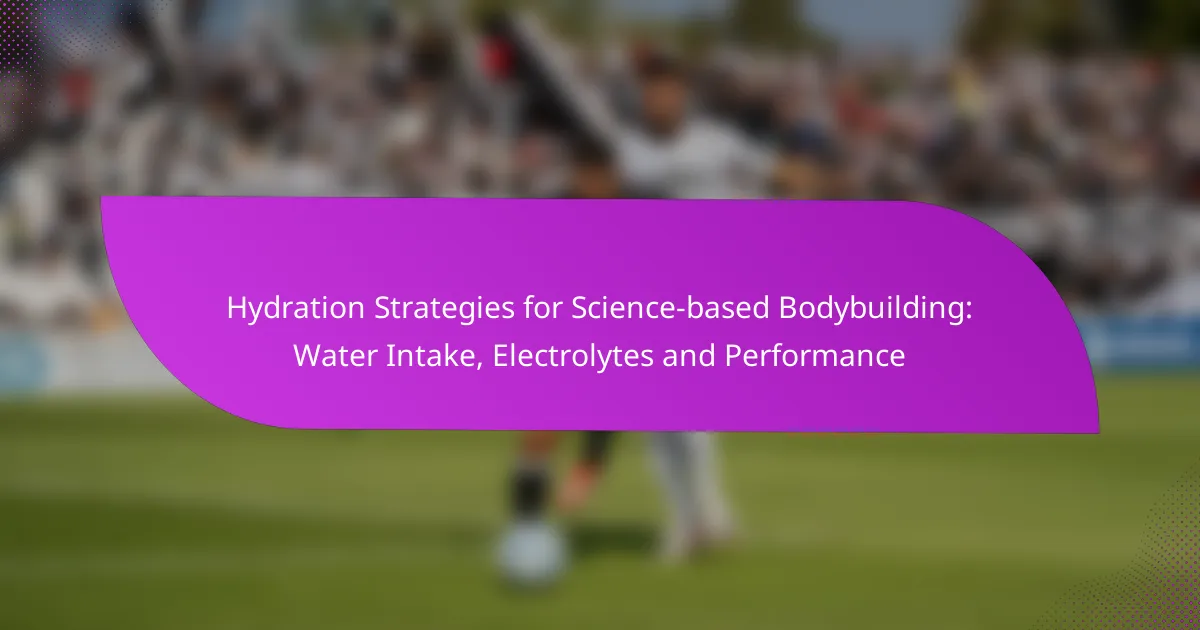Post-workout nutrition is vital for bodybuilding, focusing on foods that enhance muscle recovery and restore energy levels. Consuming a balanced mix of protein, carbohydrates, and healthy fats within 30 to 60 minutes after exercise is crucial for optimal recovery and muscle growth. Additionally, staying hydrated supports nutrient transport and waste removal, further aiding in recovery and reducing soreness.

What Are the Best Post-Workout Foods for Bodybuilding?
The best post-workout foods for bodybuilding are those that effectively aid in muscle recovery and replenish energy stores. A balanced intake of protein, carbohydrates, and healthy fats is essential to optimize recovery and support muscle growth.
Protein-rich foods
Protein-rich foods are crucial for muscle repair and growth after workouts. Aim for a protein intake of about 20-30 grams within 30 minutes post-exercise to maximize muscle protein synthesis. Good sources include chicken, turkey, fish, eggs, and dairy products like Greek yogurt.
For those who prefer convenience, protein shakes or bars can also be effective. Look for options that provide a high-quality protein source, such as whey or casein, to support recovery.
Carbohydrate sources
Carbohydrates are vital for replenishing glycogen stores depleted during exercise. Consuming 40-60 grams of carbohydrates shortly after a workout can help restore energy levels. Ideal sources include fruits, whole grains, and starchy vegetables.
Combining carbohydrates with protein can enhance recovery further. For example, a banana with a scoop of peanut butter or a bowl of oatmeal topped with berries provides both nutrients effectively.
Healthy fats
Healthy fats play a supportive role in post-workout nutrition by providing essential fatty acids and aiding in nutrient absorption. Incorporate sources like avocados, nuts, seeds, and olive oil in moderation. Aim for about 10-15 grams of healthy fats after workouts.
While fats are important, avoid consuming large amounts immediately post-exercise, as they can slow digestion. Instead, include them in meals consumed later in the day.
Examples of recovery meals
Recovery meals should combine protein, carbohydrates, and healthy fats for optimal results. Some effective examples include grilled chicken with quinoa and steamed vegetables, a smoothie made with protein powder, spinach, and a banana, or a whole-grain wrap filled with turkey and avocado.
Consider meal timing as well; aim to eat within 30-60 minutes after your workout to maximize recovery benefits.
Plant-based options
For those following a plant-based diet, there are plenty of post-workout food options that provide the necessary nutrients. Legumes, tofu, tempeh, and seitan are excellent protein sources. Pair these with whole grains like brown rice or quinoa for a complete meal.
Incorporating nuts, seeds, and avocados can help meet fat requirements. A chickpea salad with quinoa, mixed greens, and a tahini dressing is a nutritious post-workout option that balances protein, carbs, and healthy fats.

When Should You Consume Post-Workout Nutrition?
Post-workout nutrition should be consumed as soon as possible after exercise, ideally within 30 to 60 minutes. This timing helps maximize recovery and muscle repair by replenishing glycogen stores and providing essential nutrients.
Optimal timing for recovery
The optimal timing for recovery nutrition is crucial for effective muscle repair and growth. Consuming a balanced meal or snack that includes carbohydrates and protein shortly after your workout can enhance recovery. Aim for a combination of 20-30 grams of protein and 40-60 grams of carbohydrates to support muscle recovery.
If you can’t eat a full meal right away, consider a protein shake or a snack like Greek yogurt with fruit. This can provide the necessary nutrients quickly and efficiently.
Importance of the anabolic window
The anabolic window refers to the period after exercise when your muscles are particularly receptive to nutrients. This window typically lasts for about 30 to 120 minutes post-workout. During this time, your body is primed to absorb nutrients that can aid in muscle repair and growth.
Missing this window can hinder recovery and muscle gains. To take advantage of this period, prioritize easily digestible foods or supplements that provide the right balance of macronutrients. Keep in mind that while the anabolic window is important, overall daily nutrition is equally vital for long-term progress.

How Does Hydration Impact Recovery?
Hydration plays a crucial role in muscle recovery after workouts by facilitating nutrient transport and waste removal. Proper fluid intake helps maintain performance, reduces soreness, and speeds up recovery times.
Role of water in muscle recovery
Water is essential for various physiological processes, including nutrient absorption and muscle repair. After intense exercise, muscles lose water through sweat, which can lead to dehydration and hinder recovery. Ensuring adequate water intake post-workout helps restore fluid balance and supports optimal muscle function.
Aim to drink at least 500-750 ml of water within two hours after exercising to aid recovery. This amount can vary based on exercise intensity and individual sweat rates.
Electrolyte balance
Electrolytes, such as sodium, potassium, and magnesium, are vital for maintaining fluid balance and muscle function. During exercise, these minerals are lost through sweat, and their depletion can lead to cramps and fatigue. Replenishing electrolytes is essential for effective recovery.
Incorporate electrolyte-rich foods or drinks, such as sports drinks, coconut water, or bananas, into your post-workout nutrition. This helps restore balance and supports muscle recovery.
Hydration strategies
To optimize hydration, establish a routine that includes drinking fluids before, during, and after workouts. Monitor your hydration status by checking the color of your urine; light yellow indicates adequate hydration, while dark yellow suggests a need for more fluids.
- Drink water regularly throughout the day, not just around workouts.
- Consider using electrolyte supplements if you engage in prolonged or intense exercise sessions.
- Experiment with different hydration strategies to find what works best for your body and training regimen.

What Are the Key Nutritional Components for Recovery?
The key nutritional components for recovery after workouts include essential amino acids, vitamins, and minerals. These nutrients play a crucial role in muscle repair, immune function, and overall recovery efficiency.
Essential amino acids
Essential amino acids (EAAs) are vital for muscle recovery as they help repair and build muscle tissue. Consuming a source of EAAs shortly after a workout can enhance protein synthesis and reduce muscle soreness.
Good sources of EAAs include protein-rich foods such as chicken, fish, eggs, and dairy products. For those following a plant-based diet, options like quinoa, soy, and legumes can provide adequate amounts of these critical nutrients.
Vitamins and minerals
Vitamins and minerals support various bodily functions that are important for recovery. Key vitamins, such as vitamin C and vitamin D, help reduce inflammation and support immune health, while minerals like magnesium and zinc play roles in muscle function and recovery.
To ensure adequate intake, focus on a varied diet rich in fruits, vegetables, whole grains, and lean proteins. Supplements may be beneficial in certain cases, but it’s best to consult with a healthcare professional before starting any new regimen.

How to Choose the Right Supplements?
Choosing the right supplements for post-workout recovery involves understanding your specific needs and goals. Focus on supplements that support muscle repair, replenish energy stores, and enhance hydration.
Popular post-workout supplements
Common post-workout supplements include protein powders, branched-chain amino acids (BCAAs), creatine, and electrolyte drinks. Protein powders, such as whey or plant-based options, help in muscle recovery by providing essential amino acids. BCAAs can reduce muscle soreness and improve recovery times, while creatine enhances strength and performance in subsequent workouts.
Electrolyte drinks are crucial for rehydration, especially after intense sessions. They help restore lost minerals like sodium and potassium, which are vital for muscle function and overall recovery.
Criteria for selecting supplements
When selecting post-workout supplements, consider factors such as ingredient quality, dosage, and your dietary preferences. Look for products with minimal additives and a transparent ingredient list. Aim for protein supplements that provide around 20-30 grams of protein per serving for optimal recovery.
Additionally, assess your individual goals. If muscle gain is your priority, prioritize protein and creatine. For endurance athletes, electrolyte balance and carbohydrate replenishment may be more critical. Always consult with a healthcare professional or nutritionist to tailor your supplement choices to your specific needs.

What Are Common Mistakes in Post-Workout Nutrition?
Common mistakes in post-workout nutrition include neglecting to refuel properly, consuming inadequate protein, and failing to hydrate. These oversights can hinder recovery and muscle growth, impacting overall performance.
Not Consuming Enough Protein
One of the biggest errors is not consuming sufficient protein after a workout. Protein is essential for muscle repair and growth, and aiming for about 20-30 grams within 30 minutes post-exercise is a good target. This can be achieved through sources like protein shakes, chicken, or Greek yogurt.
Many athletes underestimate their protein needs, often relying solely on meals instead of incorporating quick post-workout snacks. Consider adding a protein-rich snack if your next meal is more than a couple of hours away.
Ignoring Carbohydrate Intake
Carbohydrates play a crucial role in replenishing glycogen stores depleted during exercise. Failing to consume carbs can lead to fatigue and hinder recovery. Aim for a ratio of 3:1 carbohydrates to protein after workouts to optimize recovery.
Good carbohydrate sources include fruits, whole grains, and starchy vegetables. For example, a banana with a scoop of protein powder or a turkey sandwich on whole-grain bread can be effective options.
Delaying Post-Workout Nutrition
Timing is critical in post-workout nutrition. Delaying your intake of nutrients can reduce the effectiveness of recovery. It’s best to consume your post-workout meal or snack within 30-60 minutes after exercising.
To ensure you don’t miss this window, consider preparing your post-workout meal in advance or keeping portable snacks on hand. This way, you can quickly refuel and support your recovery process.
Neglecting Hydration
Hydration is often overlooked in post-workout nutrition. Sweating during exercise leads to fluid loss, which can impair recovery and performance. Aim to drink at least 500-750 ml of water or a sports drink within a few hours after your workout.
Monitor your hydration levels by checking the color of your urine; light yellow indicates proper hydration. If you’re training intensely or for extended periods, consider electrolyte-rich drinks to replenish lost salts.



